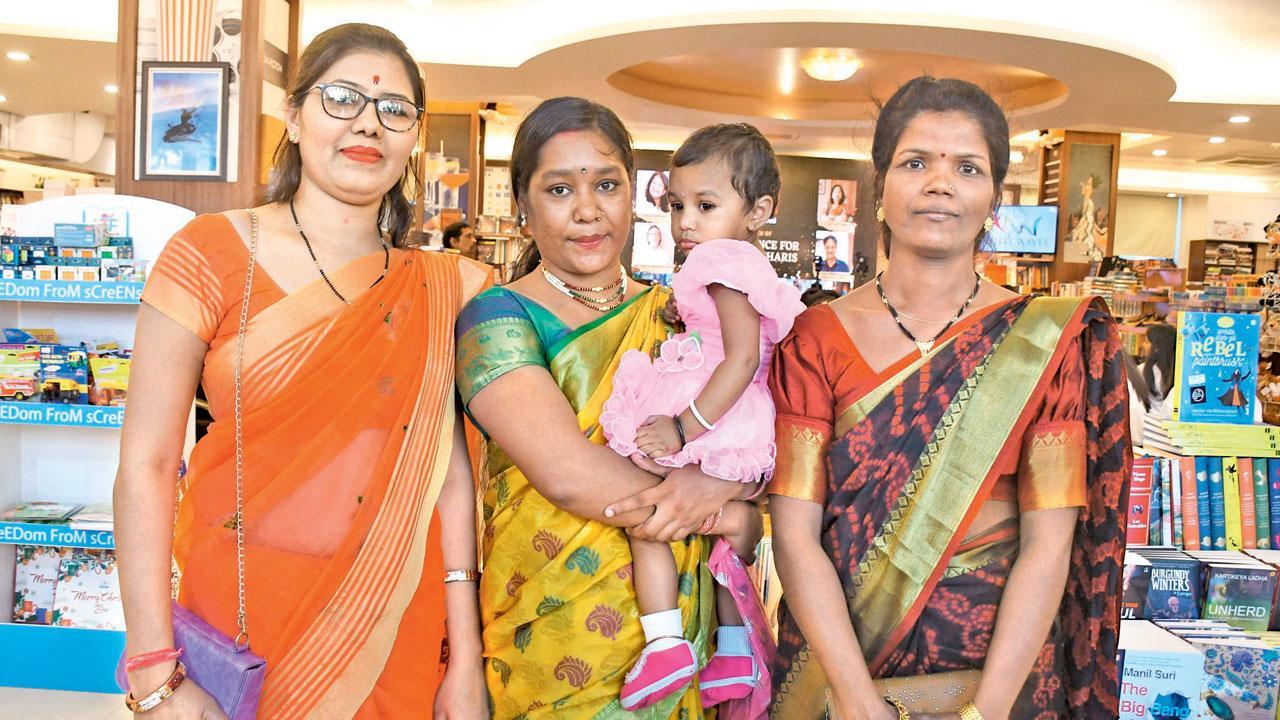Uplifting words at moving launch of website for legal assistance to safai karamcharis

The widows who got compensation. Pics/Ashish Raje
A website under the acronym ASK (Assistance for Safai Karamcharis), offering legal aid to widows and families of manual scavengers with the overarching aim of eradicating manual scavenging from India altogether, was launched at the Title Waves bookstore in Bandra West on Sunday evening.
ADVERTISEMENT
The website—askforjustice.in—is an all-India legal aid network for underserved families, who do not know how to work the legal system in the advent of their family member perishing cleaning septic tanks or going down gutters for cleaning.
Fiery
The event was a mix of the fiery and philosophical, gutsy and glam, with some Bollywood stars in attendance. It was headlined by activists Abha Singh and her daughter Isha Singh (Indian Police Service) who made an online presence. “Through the website, we want to build a pool of resources for these affected people. From seeking lawyers to volunteers, to outlining formats for filing PILs or writs, the website is a pool of information for those wronged to get justice. The bigger aim is complete eradication. When widows start asking for compensation as their legal right, we will be taking firm steps towards doing away with the scavenging completely,” Abha said.
Compassion
Abha told her young audience, the majority of whom were law students, “The ASK initiative is by the NGO the Rann Samar Foundation. Rann Samar means battleground. Life is a battleground and you need to fight the good fight. Do not simply aspire to work with big law firms so that you have fancy names to shore up your curriculum vitae (CV). A CV is redundant if you do not have compassion and commitment for justice.”
Genesis
For Abha and Isha, the springboard for ASK came after they won compensation for widows of manual scavengers. Vimla Chorotiya, Neeta Kalshekar and Baani Debnath, the emotional but courageous trio present at the event, were paid R10 lakh each by the Maharashtra government as compensation after losing their husbands. The milestone 2021 order by the Bombay High Court set the roadmap for ASK.
Abha explained the obstacles they faced en route to the order. “The civic authorities insisted that they have no manual scavengers because they have ‘outsourced’ the task. I said, ‘You cannot outsource death’,” she pronounced to applause. Though manual scavenging has been banned in India, under the Prohibition of Employment as Manual Scavengers and Rehabilitation Act 2013, the practice continues with workers forced to go down manholes, clean gutters etc, that too, without safety gear.
Heroes
Isha Singh who spoke, joining online, proved she had inherited the same ‘jazbaa for justice’ from her parents, mother Abha and father former IPS officer Y P Singh. Isha said, “This was the first case I argued and it changed my life. I was fired up by one statement by these widows who had said, ‘This system does not work for people like us’. I wanted to show them, it does and it can,” she said, adding, “It is you, the three widows who are my real heroes.”
Also Read: Mumbai: How will Adani fiasco affect the Dharavi project?
Inspiration
Heroes brought us to Bollywood, and film director and writer Rakeysh Omprakash Mehra, of Rang De Basanti and Bhaag Milkha Bhaag fame, said on the occasion, “The real guests of honour are you, the widows. We are inspired seeing your courage.”
Actor and wrestler Sangram Singh told the youngsters, “Happiness is the highest form of success. I appeal to you to find happiness through causes like these.” He added, “Look after your physical health. For that, I have a formula: eat slightly lesser than your appetite, drink double the amount of water, work out thrice as much and laugh, four times that.”
Susieben Shah, a women’s rights activist and founder of a women’s taxi service, stressed the importance of empowering women. “By making them financially able to stand on their two feet. With money in your pocket, you have a voice,” she said and nodded towards the widows, all of whom are transformed from weeping widows to working women responsible for the upkeep of their children. “You have fought the long fight, and stood on your two feet,” she added.
2021
The year the high court passed landmark order
 Subscribe today by clicking the link and stay updated with the latest news!" Click here!
Subscribe today by clicking the link and stay updated with the latest news!" Click here!










